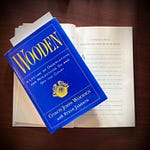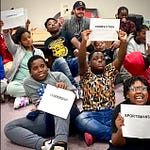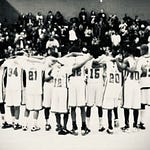I’d like to explore poise and toughness and add a little storytelling. I’ll tell you a story of one of my favorite teachable moments as a coach in relation to poise and toughness. But first, let’s look at the actual meaning of the words.
In my opinion, one of these two words, poise and toughness, if not both, belong on the every team’s list of core values.
Let’s look at the definition of poise:
To hold or make steady by balancing (Merriam-Webster Dictionary).
Calm confidence in a person's way of behaving, or a quality of grace and balance in the way a person holds or moves their body (Cambridge English Dictionary).
A state of balance or equilibrium, as from equality or equal distribution of weight; a dignified, self-confident manner or bearing; composure (Collins Dictionary).
A calm, confident manner; a graceful way of walking, moving, standing (Britannica).
For me, poise is the most crucial state of being in sport, because it requires so much prior preparation and experience before achieving that state. I explain poise to my players as the ability to be the best version of yourself in practice or competition - mentally, emotionally, and physically - no matter the circumstance. It must be taught. It must be practiced. It must be reviewed over and over. It must exist individually and collectively if we aim to achieve competitive greatness. As coaching legend, John Wooden, puts it in his book - an all time favorite of mine - Wooden - A Lifetime of Observations and Reflections On and Off the Court - competitive greatness is simply “being at your best when you best is needed. It’s enjoying the challenge when things become difficult, even very difficult.” For Coach Wooden, competitive greatness was at the top of his pyramid of success.
I tell players often, we have to prepare enough to be great, to be the best version of ourselves no matter how good or bad your competition may be; no matter the score; no matter what happened the day before; no matter how good or bad you’re playing as an individual; no matter the mistakes you just made or the successes you just achieved.
Poised players are trusted. We trust that we know who you are in all circumstances. We know you will bounce back from mistakes immediately. We know you will bounce back from successes, immediately. We can trust your mindset on the next play. I want my players to be poised. I want my players to be tough. I want my coaching staff to be the same. I want us to be a team that trusts one another. We will not engage in the distractions that non-poised teams tend to consume.
For me, poise is toughness, or is at least a prerequisite quality to toughness. They exist as one in the same for me, or, I suppose, I don’t know how one exists without the other. I like to keep them in the same terminological family because I think it helps players understand the actual definition of each word. And definitions are very important.
Toughness is not being talked about enough anymore. In some environments, the word, toughness, has somehow found itself judged as a contributor to toxic masculinity. As if to say it, when we tell somebody to toughen up or to be tough, we’re encouraging some sort of premeditated bullyish physicality or an intimidating response to other’s aggression. As if we are encouraging a fight or a posturing. That’s not toughness. Toughness is not a display. It’s quite the opposite. Let’s teach toughness, correctly. Let’s allow the word to exist and flourish again within it’s actual definition. Let’s not butcher the English language with judgment by allowing ideologues to change the definition of the word based on their opinion. There is, ironically, and actual definition of the word toughness, and, coaches should indeed express this definition when using the word with athletes.
The definition of toughness:
The state of being strong enough to withstand adverse conditions or rough handling; the ability to deal with hardship or to cope in difficult situations. (Oxford Dictionary).
The quality of being strong and not easily broken or torn; physical or emotional strength that allows someone to endure strain or hardship. (Merriam-Webster).
Poise and toughness are not about posturing or intimidation or trying to look some sort of part. They’re not theatrical. They’re not about trash-talking. They’re not about responding to or creating distractions (nonsense) on the court or field. They’re not about spending precious time practicing your choreographed personal celebration of a great play you made as an individual. They’re not about getting elevated or more geared up for the great opponent more than the average opponent. In fact, I preach to my players that poise and toughness require us to not recognize the opponent as a factor, as if they don’t exist. The opponent is not the battle. The opponent has no name or face. The game is about you and the ball, us and the ball. Our game. Our approach. Our choices. The battle is within us. We are not weak, reactionary, distracted athletes. We simply work hard on our poise. We simply work hard on our toughness, enough to become it, not display it. We work relentlessly to be the best version of ourselves - mentally, emotionally, and physically. We practice poise and toughness. It’s never not built into a practice. We practice failure, poise, and growth, failure, poise and growth. It’s never not coached. It’s not a label we can just give ourselves. We must be in constant pursuit of growth in poise and toughness. It’s a behavior we have to run after, and we can’t just be it without intentional practice.
The opponent’s approach does not impact our approach. If we knock you down, we’ll pick you right back up, because you don’t exist in our minds. We will knock you down again, and pick you back up, again. Physicality is part of the game, but we have no intention to gloat about knocking you down because it doesn’t matter. The opponent doesn’t exist. The real battle, again, is within us.
In my book, I wrote a short poem that serves as simple message to athletes about where the daily battle really exists. It’s called You And the Ball.
YOU AND THE BALL
Young Athlete,
The source of our motivation,
Often a common mental miscue,
That the daily battle you think you face.
Is against the uniformed opponent - untrue.
Best you evolve your thinking now,
For the fiercest battle of all,
Is relentlessly and endlessly internal,
It's versus you, and the ball.As a basketball coach, I wouldn’t let my players look at the other team during warm-ups. Our 15 minute warm-up time was a chance to practice, to get better. 15 minutes is a long time when used well and I still cringe at how underutilized it is as an improvement mechanism. Let the other team watch us practice. Let them be distracted from their own preparation. We don’t recognize their existence because our poised minds require us to be present. When we’re present, we are focused. When we are focused, we improve.
One of my favorite teachable moments around poise came as a high school basketball coach some years ago in Chicago. I has a senior-laden team, many of which I had coached for four years. Within our conference, we were a very good team, but we weren’t a team that was going to “wow” you. We were tenacious and skilled on defense. We would lull you to sleep in a methodical way on offense, wearing you down ball with movement. We controlled the time of possession. We were the team that you always felt you could beat, but walked away wondering how you lost. Our scores would be in the range of 44-32, 47-40, 39-33, etc. If we were up by 7 points going into the 4th quarter, we were going to win, and you’d still walk away feeling like you should have beaten us.
Except once.
It was late in that season. We were 11 and 0 in conference with two regular season conference games remaining. In two weeks, we would be the number one seed in the conference tournament. This game found us on the road against a formidable opponent that was very athletic, streaky, and completely fired up to play against us. They were capable of beating anybody in our conference on any night. They even made this their homecoming game. We had beaten them by 4 earlier in the season.
We talked at length before the game about our poise, our toughness, our approach. This was the biggest game of the year for them. It was their biggest crowd. It had distractions, if we let the distractions exist within us. But they - the opponent - do not exist within us. We are playing our game, a game versus us and the ball. Their hype would be palpable. But if we were to be successful, their hype could not gain any of our attention on a possession by possession basis. It had to be mute. We had to be mute.
And we were right where we wanted to be going into the 4th quarter. We were winning, in a typical fashion, 37-30.
And then we made a choice. It was a bad choice. We reacted.
Halfway through the 4th quarter, their power forward scored a bucket and was fouled - an and-one. The crowd - once seemingly bored or discouraged - went crazy. Their player started jawing and taunting a couple of our players after the foul was called. And we, unlike any other time, responded. One of our players jawed back, not enough for a technical, but enough for the referee to intervene. And more than enough to wake the beast at the exact wrong time. The opponent and the crowd fed off this moment.
The opponent was asleep and frustrated until that point. They couldn’t find a rhythm and were looking for anything to create a spark. We gave it to them. We did it to ourselves. They proceeded to hit a three on the next two possessions to take a two point lead. We never recovered, losing by 4.
I remember telling my assistants in the final seconds: “this is good, really good, I’m glad we lost.” Sounds made up, but it wasn’t. To me. a loss as a result allowed more education from this teachable moment than there would have had we recovered. Of course I wanted to win, and of course, I was furious we lost in that manner. But I was ready to capture this moment. I was ready for immense growth. I loved this team, dearly, and it was important for me to get this one right. I felt the pressure to do this well.
I told the assistants to have the players sit in the locker room until I arrived. I wanted there to be some uncomfortable minutes. This was going to be a moment. Now, you might be thinking that I walked in and calmly made it a loving, keep-your-head-up, growth moment. That sounds good on paper and perhaps in self-help books. But it wasn’t reality. I got loud, intentionally - very, very loud. But I was still poised and purposeful. The reality of coaching is that when you elevate your speech and tone, it should have an impact and a purpose. It should be rare, otherwise it becomes noise. You shouldn’t curse, call them names, belittle, or put them down. But loud? Yes. Tone matters. They needed to understand the importance of this teachable moment. They needed something they’d never forget.
This was a loud moment, as I and some of the player remember it, fondly.
I burst through the door, slamming it behind me.
THANK YOU! I yelled. I then paused for about 10 seconds and made eye contact with each player.
THANK YOU!
THANK YOU SENIORS FOR GIVING US A TEACHABLE MOMENT, AND THANK YOU TO THE GOOD LORD FOR GIVING ME THIS MOMENT WITH PLAYERS I CARE ABOUT SO DARN MUCH. I FAILED YOU AS A COACH AND YOU, IN TURN, FAILED ONE ANOTHER TONIGHT.
And then I took it up another level:
I’M SO GLAD THAT AT THE POINT IN WHICH WE…WE…DECIDED TO BE LESS THAN WHAT WE KNOW TO BE - WHEN WE…WE…LOST OUR POISE, WHEN WE DECIDED THAT OUR TOUGHNESS WAS NO LONGER A CORE VALUE, THAT THIS WAS THE END RESULT. AS YOUR COACH, I’M SO PAINFULLY THANKFUL THAT YOU, YOU, YOU, YOU, YOU, YOU, YOU, YOU, AND YOU (pointing at our 8 seniors) AND ME, AND THE COACHES, CAN WALK AWAY FROM YOUR CAREER KNOWING…KNOWING…THAT WE EXPERIENCED SUCH AN IMPACTFUL TEACHABLE MOMENT! THAT YOU NOW REALIZE THE DIFFERENCE BETWEEN US AND OUR OPPONENTS IS NOT OUR TALENT, BUT IS INDEED OUR PREPARATION BEFORE THE GAME AND OUR POISE DURING IT.
A softer but still, fierce, tone:
I cannot tell you how happy I am that when you coach your kids someday you’ll actually have a story you can tell about what poise and toughness actually means versus what others think it is by what they see on TV. I’m also glad that they’re in their locker room celebrating and now believe they are better than you, that they proved what they thought about us. “They aren’t that good. We can beat them. We got this league.” Because what they experienced was temporary and it was false. And when we play them again in the conference tournament, they’ll take that false confidence into the game and we won’t dare lose our poise EVER again. I hope we play them again, I hope we do. Because when they are them, and we are us - THE REAL US - I guarantee you, right now, we will win.
You think about this and let it soak in from now until we get back to school. I don’t want to hear one word from anybody until we get off that bus. You let this hurt, and then you learn, and then you grow.
Bring it in.
We huddled, got dressed, and left, in complete silence. You can judge the demand for silence all you want. I stand by accentuating the teachable moment with mandatory silence, on rare occasions. I wanted them to remember this forever. I wanted reflection. I wanted education. I also wanted them to know that I fully believed in us, when we stayed true to ourselves.
As coaching luck would have it, we did meet the other team in the semifinals of the conference tournament two weeks later. In a tie game with eight seconds remaining and the ball in our possession, we cleared a lane for our point guard and he was fouled going up for a shot with no time left on the clock. He missed the first free throw, look over at me, nodded, flashed a quick smile, I nodded back, and then hit the second free throw. Game over. He was poised. Make or miss, he wanted to be there in that moment.
We would go onto to win the conference championship a couple days later. The final score was a very typical 47-40. We were down 21-17 at the half. We weren’t playing well offensively, but we knew had them right where we wanted them on defense. At halftime, one of my seniors echoed that to the team as soon as we entered the locker room. “We’re good y ’all, we got em’, we got em’ right where we want em’.” I then looked at the team and said, “That’s right. Now, you all talk about what that means on your own. Coaches, we’re going to walk outside. Team, this one is yours.” I took the coaching staff outside the locker room and told them we were going to be okay, because we could see and feel the poise. The team gave itself the halftime speech, and based on what happened just a couple weeks earlier, they were well equipped to do so.
The opponent didn’t score a point in the 3rd quarter.
And sometimes, when we are truly lucky as coaches, the teachable moments work out that way. But, whether the outcome lands on our side or not, we must never avoid the teachable moments. We have to take that chance, every single time. We must not fear the teachable moments. The teachable moments are planted seeds that will someday bloom.
Teach poise. Teach toughness.
To those seniors - Davondray, Justin, Gilbert, Tavares, Brandon, Rashod, Javaris, Ryan, and Louis - thank you for all of it.
As always, be great and break barriers,
Jason Aron Ronai













Share this post